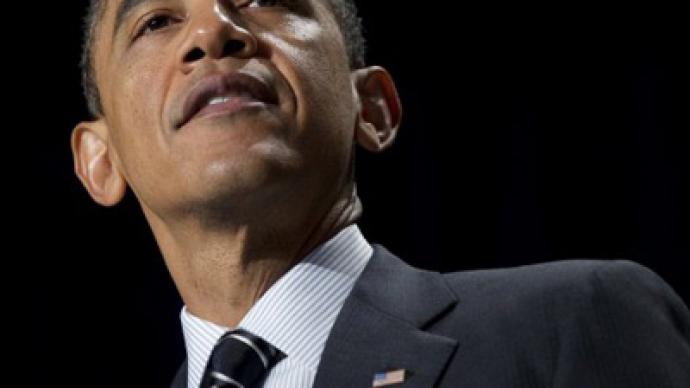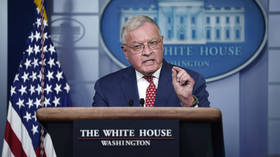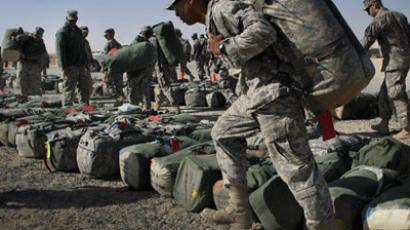Pentagon pushes to leave Afghanistan as soon as possible

Barely a month after the last US combat troops walked out of Iraq, the Pentagon announced on Wednesday that they would be altering already established plans in Afghanistan and doing the same there in a matter of months.
US Defense Secretary Leon Panetta on Wednesday announced that American combat troops will plan to vacate the nation of Afghanistan in 2013, a decision that contradicts a long-standing schedule that would have left the US military on an offensive role there through at least 2014. "Our goal is to complete all of that transition in 2013, and hopefully by mid- to the latter part of 2013, we'll be able to make a transition from a combat role to a training, advise and assist role," Secretary Panetta told reporters aboard a plane on Wednesday. Prior to the breaking announcement, US combat troops were expected to stay in Afghanistan until the end of 2014. Although they may stay stationed there for just as long still, Panetta wants offensive operations from American personnel winding down sometime during the next year.The news of the decision comes almost immediately after a recent report that found US intelligence believes the Taliban will be able to successfully regain control even after American forces leave Afghanistan. The US and Taliban were believed to be initiating peace talks in order to negotiate a safe return of Afghanistan to Taliban rule, but more than ten years into a war that has provided few successes and massive casualties and disappointment, Panetta’s new plan seems to speed up the withdrawal process before matters worsen anymore.Since entering Afghanistan after the September 11 terrorist attack more than a decade ago, US forces have seen casualties amounting to a total of 1,808, according to the latest statistics from the iCasualties website. Insurgent deaths are estimated to be roughly 40 times that figure. Combined with the recently ended war in Iraq, American casualties in both operations come to more than 6,000.Despite such a tremendous number of deaths and ten years of fighting, victories for American forces have been few and far between in Afghanistan. It has been nearly a year since former al-Qaeda leader Osama bin Laden was executed in neighboring Pakistan, and as the Taliban still has a hold in Afghanistan — and is expected to continue it for the unforeseeable future — furthering operations seems futile. As American deaths continue to pile up while Operating Enduring Freedom fails to secure a win for the US, the losses seem to overpower any successes American troops have had. The Obama administration has called one of its biggest victories in the War on Terror aside from the bin Laden assassination the execution of two men with alleged al-Qaeda ties late last year. Both men, however, were also American citizens that were killed by drone strikes without ever being brought to trial. Instead of being proven to pose a problem for American forces, the White House reported that the two Americans were merely threats. The actions were viewed by some as a victory for the American military, but as the capabilities of the commander-in-chief were made public, many US citizens called it a loss for freedom. “Can you imagine being put on a list because you're a threat? What's going to happen when they come to the media?” Republican presidential candidate and Texas Congressman Ron Paul reacted to the news. “What if the media becomes a threat? … This is the way this works. It's incrementalism.”Although the decision to end the war soon would add to the number of ended offensive operations under President Barack Obama’s belt if he secures a second term in the White House, critics are already attacking the administration for the new plan. Republican frontrunner Mitt Romney wasted no time responding to the news on Wednesday, offering some harsh words for the White House if they seriously want to end attacks on the Taliban ahead of plan."The president's mistakes, some of them are calculated on a philosophy that's hard to understand and, sometimes, you scratch you head and say: How can he be so misguided and so naive?" Romney asked a room of warehouse workers while campaigning in Las Vegas, Nevada on Wednesday. "Today, his secretary of defense unleashed such a policy," added Romney. "The secretary of defense said that on a day certain, the middle of 2013, we're going to pull out our combat troops from Afghanistan. He announced that. He announced that. So the Taliban hears it, the Pakistanis hear it, the Afghan leaders hear it," said Romney. "Why in the world do you go to the people that you're fighting with and tell them the date you're pulling out your troops? It makes absolutely no sense.""His naiveté is putting in jeopardy the mission of the United States of America and our commitments to freedom," he said. "He is wrong. We need new leadership in Washington."The US is expected under Secretary Panetta to have only 68,000 troops remaining in Afghanistan by this autumn. A poll conducted by the Pew Research Center published in October revealed that a third of American veterans who have served since 9/11 agreed that the Afghan and Iraq wars were “not worth it.”














